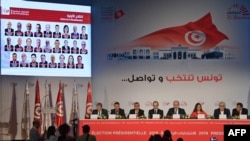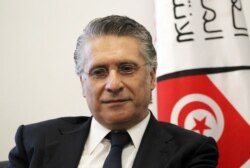Tunisia's independent electoral commission Tuesday confirmed the stunning victories of two political outsiders in the first round of presidential voting — results seen as a major rebuff of the post-revolution political establishment.
Final results place law professor Kais Saied and business tycoon Nabil Karoui in first and second place respectively, capturing more than 18% and 16% of the vote. They now face a runoff in what is Tunisia's second-only free and democratic presidential election.
But the bigger story may be the losers, starting with Prime Minister Youssef Chahed, who received just over 7% of the vote. Defense Minister Abdelkarim Zbidi also scored in the single digits. Turnout was less than 50% — another marker of voter disaffection.
Tunisian journalist Tarek Mami of France Magreb 2 radio says Tunisians got rid of one system during the revolution — that of autocratic President Zine El Abidine Ben Ali. Now, they're getting rid of the system that replaced him. Widespread corruption and soaring food prices helped to fuel voter anger.
Saied and Karoui have one thing in common — both are newcomers when it comes to running for office. Both also kept low profiles during campaigning these past weeks, but for different reasons.
Karoui was jailed in August on corruption allegations — a move his supporters claim was politically motivated. Saied rejected state election funds and large rallies, favoring door-to-door campaigning. Saied is a social conservative and a frequent legal commentator on television. Karoui scored points with the poor for his foundation's charitable works.
Social entrepreneur Wala Kasmi didn't vote for Saied and was surprised by the results.
"But at the end, I think I'm happy about not the full results, but the results, because I think we are back to eight years ago, challenging the status quo, claiming a new model, a new system. ... I think he's the new voice of the revolution," Kasmi said.
This is the first round in the election season. October's legislative vote comes next, offering another test of whether Tunisians will continue to sanction the political establishment.






